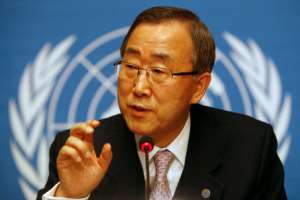
The United Nations Secretary General, Mr. Ban Ki-Moon is expected to arrive in Accra tomorrow,(Thursday, December 18, 2014) for a high level discussion with the Ghanaian Leader, President John Dramani Mahama.
Announcing the trip at a news conference at the UN headquarters in New York today, the Secretary General acknowledged the leadership role Ghana, is playing in the fight against the dreadful Ebola virus that has claimed more than 6000 lives in the West African sub-region.
The Ghanaian capital, Accra is where the UN's first-ever system-wide emergency health mission, known as the United Nations Mission on Emergency Ebola Response (UNMEER) headquarters is located.
The UN boss is being accompanied by Dr. Margaret Chan, Director General of World Health Organization(WHO), Dr. David Nabarro, Special Envoy on Ebola and Dr. Bruce Aylward, Senior Advisor to the Director General of the WHO. The delegation will be joined by Mr. Tony Banbury, the Secretary General's Special Representative in Ghana.
From Ghana, Mr. Ban Ki-Moon is expected to visit Guinea, Liberia, Mali and Sierra Leone, the four countries most affected by the Ebola outbreak.
" I want to see the response for myself, and show my solidarity with those affected and urge even greater global action.
Ebola responders are doing heroic work. Local communities and national governments are highly engaged. There has been an impressive outpouring of life-saving contributions from across Africa and across the world. The Ebola response strategy is working, and we are beginning to see improvements", Mr. Ban KI-Moon stated.
The outbreak of Ebola in West Africa, he noted had significantly challenged the international community in unprecedented ways.
Emphasizing the urgent need to intensify the fight against Ebola, the Secretary General noted that it was "not the time to ease up on our efforts. As long as there is one case of Ebola, the risk remains. We must do everything we can to get to zero".
Identifying some of the difficulties on the ground, he said at the same time, "we remain short of people and resources. Moreover, Ebola continues to drive up food prices, keep children out of school and draw oxygen away from business activity".
On the UN's peace operations, diplomacy and humanitarian capacities, he acknowledged that it had been pushed to the limit, ''more than 100 million people need assistance and more than 50 million people have been driven from their homes – the most since the Second World War".
Commenting on South Sudan, he said that the UN's “open gates” policy saved many thousands of lives, but the situation at the peacekeeping bases -- where UN is sheltering 100,000 people -- remains fragile, as it does throughout the country.
The Secretary General lamented about the spread of extremist insurgencies in Nigeria and Iraq, widespread instability in Afghanistan and the Sahel apart from the Ukrainian situation , with its regional and global implications.
Mr. Ban Ki-Moon called for a total global action next year by forging a new development agenda and securing a climate change agreement. Aside this, he said the world must do more to counter extremism and the rise of far-right political parties that target minorities, migrants and in particular Muslims. Other key measures the UN will include panels on peace operations and averting the escalation of other worrying situations in places like Syria.




 Election 2024: Power outages will affect NPP – Political scientist
Election 2024: Power outages will affect NPP – Political scientist
 NPP is 'a laughing stock' for luring 'poster-stickers', 'noisemaking babies' wit...
NPP is 'a laughing stock' for luring 'poster-stickers', 'noisemaking babies' wit...
 Dumsor: Matthew Opoku Prempeh must be removed over power crisis – IES
Dumsor: Matthew Opoku Prempeh must be removed over power crisis – IES
 PAC orders WA East DCE to process requests from their MP
PAC orders WA East DCE to process requests from their MP
 Defectors who ditched Alan’s Movement to rejoin NPP were financially induced – A...
Defectors who ditched Alan’s Movement to rejoin NPP were financially induced – A...
 Dumsor: Akufo-Addo has taken Ghanaians for granted, let’s organise a vigil – Yvo...
Dumsor: Akufo-Addo has taken Ghanaians for granted, let’s organise a vigil – Yvo...
 April 23: Cedi sells at GHS13.66 to $1, GHS13.07 on BoG interbank
April 23: Cedi sells at GHS13.66 to $1, GHS13.07 on BoG interbank
 GRA clarifies tax status of resident individuals earning income abroad
GRA clarifies tax status of resident individuals earning income abroad
 2024 elections: NDC to officially unveil Jane Opoku-Agyemang as running mate tom...
2024 elections: NDC to officially unveil Jane Opoku-Agyemang as running mate tom...
 Bawumia embarks on working visit to Italy and the Vatican to boost bilateral tie...
Bawumia embarks on working visit to Italy and the Vatican to boost bilateral tie...
